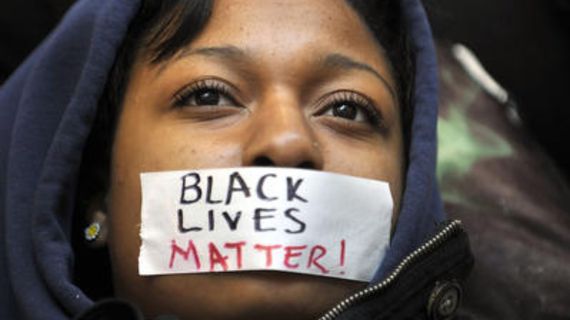As we begin 2016, it is common to see hashtags such as #2016Goals and social media posts concluding with the phrase,"New year, new me." After all, the New Year is a time for alteration, redemption, and, most importantly, hope- the thing that makes all goals possible. Nevertheless, as we close 2015 with the non-indictment of yet another police officer, this time for the fatal shooting of twelve-year-old Tamir Rice, these goals become more distant. The future of the black community becomes bleak. This is in part because it is the embodiment of the black community's future, black youth, that are constantly being killed by law enforcement.
While the names seem to come and go, from Michael Brown to Sandra Bland, as do the circumstances of their deaths, one thing remains stagnant: many black persons killed by police in the past years have been under the age of thirty. Rekia Boyd was shot dead at the age of twenty-two by a police officer who believed the man she was walking with had pulled out a gun (which turned out to be a cell phone). Kendra James was shot and killed at twenty-one after a scuffle with a police officer at a traffic stop in Portland. Shelly Frey was killed by police at twenty-seven, Darnisha Harris at merely sixteen. The list goes on. As we read about these deaths in newspapers and watch footage on our news channels, we may see them as just that: deaths. After all, with more than two hundred killings of black persons by police in 2015 alone, according to The Guardian, it is no surprise that we have become numb to the sound of a police killing, a monetary settlement, or a non-indictment. However, these deaths are not just about the expiration of black bodies, but the expiration of the future of black youth. How are we supposed to look forward to a year of achievement, whether educational or internal, when it appears that our life expectancy is only thirty years? Everything is impossible until it actually occurs. These deaths only indicate the possibility of more deaths and a bleaker future for African-American youth.
We black youth are often seen as causers of our own demise. Only last month, Donald Trump tweeted questionable statistics claiming that ninety-seven percent of blacks are killed by other blacks, while only one percent of blacks are killed by police. Through statements like these, #BlackLivesMatter is replaced with fights to end black-on-black violence, as if violence by white police officers against unarmed blacks is only a tool we blacks are using to cover up our violence against one another. Our image is also flawed in media outlets. We black youth are quick to be dissected for our shortcomings - our past run-ins with the law, photos of us beyond cap-and-gown portraits, and character traits that somehow make us more deserving of death. Trayvon Martin, for example, had been characterized as a gang banger by the Chicago News Report. Also, the New York Times described Michael Brown as"no angel", because he allegedly smoked, drank, and rapped. Meanwhile, our white counterparts are dissected for the good in them. If they are not described as mentally ill, they are described as being influenced by some external force. White youth are described as acting out of character - a character that, unlike black character, is standardly set to do good. However, we are not our own demise. Our demise is the idea that black lives do not matter, which only gets closer to becoming an accepted fact each time a police officer faces no indictment for the killing of black youth, or any black person in general.
It has become the social norm to steer clear of pessimism as the new year rolls around. One may see focusing on the deaths of black youth instead of the future of black youth as pessimistic. Nevertheless, we must not confuse being pessimistic with being realistic. The voice of black youth must be heard, especially since death by death, non-indictment by non-indictment, it has only grown quieter.

